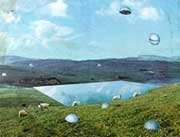Florentine avant-garde architecture collective Superstudio was at the heart of the architectural and design avant garde in the 1970s. A lot of the work, because they weren’t in a position to build, was presented through photo-collages, films and exhibitions, questioning architecture’s ability to change the world for the better and the faith in technology.
“Twelve Ideal Cities”, originally published in AD magazine, features 12 creepy dystopic fantasies of urban planning gone haywire.

![bridge-small[1].jpg](http://www.we-make-money-not-art.com/yyy/bridge-small%5B1%5D.jpg)
Among them, “City of Hemispheres” (picture on the left) imagines a crystal lake hosting more than ten million sarcophagi, the occupants kept alive by technology and granted control over the flying hemispheres, through which they are fed sensory stimuli.
But more influential than any individual project, was the idea that an architectural practice could be conceptual and theoretical, concerned with cultural criticism rather than the production of buildings.
“And that influenced the way just about every young practice goes today,” explain William Menking. “I mean some start by doing boutiques and these kind of things, but a lot of them enter competitions and do theoretical projects they know are never going to get built, that they want to get published somewhere. So that strategy of critique early in your career is what they learned from these guys.”
In 1978, the studio was disbanded, and its members became noted academics and architects.
Superstudio’s iconic Quaderna table is still in production by Zanotta. It was part of their campaign of “Anti-Design”, meant as a striking contrast to pop design, with all its curvy, colourful forms.
Via del.icio.us/architecture Metropolismag. Further information in DesignMuseum.
I was about to write a post about Diane Bromberg’s lilliputian crochet skulls but I saw the titles of today’s Google ads. Yes, yes I’m aware it sounds silly-greedy, especially since we are not making lots of $ from the ads. But I’ll be back with some more very low-tech later.
